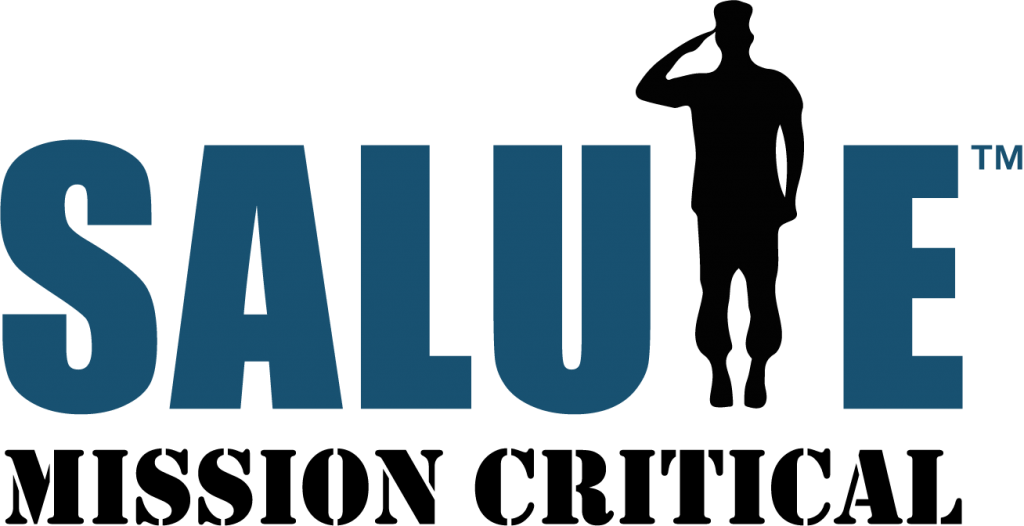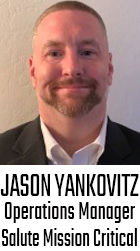Tech Innovation in AZ: Behind the numbers with Jason Yankovitz of Salute Mission Critical

Every quarter, the Arizona Technology Council publishes a data report showcasing the performance of the tech industry in the state. We’re now adding an additional layer, with the stories of the people behind the numbers—the people who are the employers and employees, the innovators and investors.
[embedyt] https://www.youtube.com/watch?v=3y0kjrGDuqA[/embedyt]
 Jason Yankovitz is an area operations manager for Salute Mission Critical, a data center services firm with offerings that include day-to-day operations and project-based services. A former soldier, over the past several years Jason has built a successful career in the data center industry.
Jason Yankovitz is an area operations manager for Salute Mission Critical, a data center services firm with offerings that include day-to-day operations and project-based services. A former soldier, over the past several years Jason has built a successful career in the data center industry.
Yankovitz joined Molly Castelazo, storyteller-in-chief at Castelazo Content, in a lively conversation that ranged from traveling the world to figuring out how to thrive after leaving the military, to pivoting from criminal justice into IT, to finally loving what you do. The full transcript, edited just for clarity, is here, with timestamps to ease navigation through the video.
[02:30] Can you talk a little bit about your nine-year military career? Where did you go? What did you do?
I can talk about some of it, but some of it, I had to sign a nondisclosure. I was an intel guy. It was intelligence. I started off basic training at Fort Leonard Wood, Missouri. Went to Fort Huachuca Arizona for training. That encompassed about the almost the first year and some change. This training was almost over a year.
My first duty station was Korea. So you got this kid from Ohio, from Cleveland, 18 years old, barely turning 19, shipped off overseas to a country I knew nothing about, barely knew where it was. And I embraced it. And I loved every minute of it. I was able to go see other locations. So the culture difference was huge. And then I can’t complain because I got to live in Hawaii for two years. I got to live in paradise and get paid for it. Not many other people can say that. And it was just an overall experience that got me to appreciate other cultures, other food, other things and places I would have never been able to see just being from back home. On my own time I went to the Philippines. I went to Japan several times. I went to Thailand several times. I got to travel. And that was all stuff that was for me an opportunity and built me up to be who I am today. Being able to grow well in the military afforded me up to be better than I could have ever had in college or otherwise.
[04:22] When you left the military, what was your vision for what your career after the military would look like?
That’s a great question, because I did not know. For lack of a better phrase, I was scared. Being the fact that I left two months after I graduated from high school. So the military was all I knew from my adulthood. And here we are nine years later. Late 20s. And I didn’t know what I want to do with myself. I know I needed to grow up and get a real job again. But it’s been forever since I had to do a job interview. How to write a resume. I didn’t know any of those things, how to translate what I did in military to a civilian resume and be able to equate that to what employers on the outside would want to see. I was able to get some help with that, obviously, through my transition out, but they still don’t prepare you for what you’re going to see when, you know, you leave the military. You don’t understand: now, I’ve got to pay for health insurance. I had a mess hall to go to every day when I’m hungry; now you don’t have that ability to just go eat whenever you’re hungry. You got to go buy food. You have to be an adult.
And I fell right into the security field as it was a natural fit for somebody leaving the military. I actually had somebody call me. I don’t even know if my resume was out on Indeed or where it was. He called me on my way to the gym one day. And that was just a natural fit as it wasn’t a hard transition for me to do. And ironically, looking back at my resume, that was always the field I fell back on. We all have our certain niches of where our comfort zones are. And that was mine.
[06:20] So was it in 2014 that you went back to school to get an associate’s degree in IT?
Well, first, I actually got a bachelor’s degree in criminal justice just because that’s the route I thought I was going to stay along. And I was finding myself stagnant and not learning anything. And that, to me, aggravates me more than anything else. So I still had some post 9/11 G.I. Bill to use. So I thought, why not diversify my resume and diversify my knowledge? So yeah, I went and got an associate’s degree in IT and four professionals certificates as well – Cisco certificates.
[07:12] What inspired you to study IT? You know, that looks like a very different path.
It really is. And a lot of people laughed at me because it’s literally a severe tangent off of doing criminal justice. I was actually doing security at the time for different company. And my post was actually in a data center. And I said ‘Yeah. I want to learn this.’ So I got some practical experience with them and I figured nobody’s gonna hire you without that knowledge. So I went to school, got that degree, and I actually left that job after getting my degree and getting those certificates because I got the opportunity which allowed me to move here to Arizona.
[07:51] Were you working for Salute when you came to Arizona?
I came to Arizona before I started working for Salute. I got here to Arizona July 1st, 2017, when it was 123 degrees when I rolled down from Flagstaff. And I was still doing remote hands work on my schedule. Military people, we need a stringent schedule. We need definition in what we do. This was nice because, yeah, I still worked from home and I had my van with all my equipment and my schedule was on a tablet and we rolled out when we had to. I still got paid 40 hours regardless. But it wasn’t me. Getting told, you know, half hour before I need to be somewhere that I need.
[08:59] How have you grown your data center career over the years with Salute Mission Critical?
As I mentioned, I was originally brought on to Salute as a security supervisor for one client. When we started in November 2017 we were at this one client location here in Phoenix. By time I left there March of the following year, we as Salute had gained the respect and the trust of that client.
And I was no longer a security supervisor I was now a security manager managing about 30 to 40 different security officers in all three locations. From there, I just showed Salute my ability to lead, my ability to get the job done, my ability to perform at a high level. Which, once again, as I told you, is the only gear I know. It’s the only way I know how to do things. So I was able to gain the respect and trust of the higher-ups and they moved me into project management from there.
From about March 2018 to January 2019 I was doing project management where I’d be shipped to different projects.
And that’s what I did time in, time out, and that just continued to foster that ability for my leaders to entrust me with whatever project it was. I’m a firm believer that if the client’s not happy. It doesn’t matter how well the job is done. If they’re not happy in the end day, then we’re not gonna get repeated. So getting the job done successfully is two parts, being able to accomplish what they want in the statement of work while ensuring that they walk away with a smile.
I firmly believe everybody earns respect and everybody deserves to be treated with respect. I also believe from the CEO down, everybody’s a human being. Everybody is approachable. Everybody is talkable. You know how to spark up a conversation and still speak to them business-wise and speak to them on a personal level, but allows them to be able to build that trust in you as well to get done what they need to get done. So I was pretty successful with project management to the point where they moved me into a role as a business operations manager.
Some national-level projects where I was coordinating and working on logistics and making sure that a certain client – we had approximately 30 locations nationally. We were able to get to the point where they called us back for repeat business as well. So from there, they said, ‘We need to get you back in front of the clients as a business operations manager.’ I managed the project where we provided a service for this particular client at 30 locations. There’s a lot of coordination with that client and being able to perform and be able to work on the logistics of getting people there. So we were successful with that and they were very happy with us, to say the least, to the point where they applauded our ability to perform at a high level and in a timely manner.
My forte is actually being able to build that relationship, forge that relationship from ground zero so they trust you’re not going to do just the bare minimum, but you’re going to do above and beyond what they need to get done. And that’s where I’m back at now. That’s what I’ve been doing right now, I’m an area manager. I manage multiple locations of multiple project managers under me.
[13:34] What’s your typical day like as an area operations manager for data centers?
I’ll give you a typical day now and then I’ll give you a typical day on a project. It’s a typical day to day. I literally am up probably around four, four thirty every morning as I have clients on the East Coast and they’re up and running by seven, seven thirty, obviously. So my day is obviously either full with meetings that I have already scheduled with current clients or I am continuing to build that relationship with the current clients I have and see if there’s anything else I can do to assist them and make the service that we are providing them better. Any other services that, you know, we at Salute can provide them. If we’re providing, you know, day porter work, let them know that we do cabling, let them know we do rack deployments as well. Let them know about the other services, everything from the commissioning to the decommissioning of a data center that we are able to provide them. And I don’t ever come out as a salesman when I do it. I want them to just know this is what I’m a provide you. And why not make it easier for you, if I may, if you’re able to put under one umbrella and one P.O., why not? And a lot of times that’s widely accepted. And you’re like, yeah, sure. Absolutely. On the flip side of that, my day is full of obviously what I call putting out fires. If there’s issues at the client – which is not very often – or there’s something that needs to be addressed immediately I’m bringing it up and I’m elevating it, escalating it up as needed.
[15:21] Do you have any advice for other vets who might be considering a career in technology or wondering ‘What’s next’?
Absolutely. If I could talk to my 2004 self, I’d give myself the same advice. Don’t be afraid. Don’t fear the unknown. Branch out. You need to trust the fact that the military gave you a certain skill set that allowed you to be where you are. Your ability to lead. Your ability to work hard day in, day out. Those skills alone translate over to any career, let alone the data center field.
When you love what you do, you’ll never work a day your life. I love what I do. It’s the first time I’ve been able to find a niche and a career where I am fully happy in everything I do. There’s good days. There’s bad days. The end of the day, I’m fully happy with what I do and where I’m at.
Visit https://salutemissioncritical.com for comprehensive data center lifecycle services and the skilled personnel to help you deploy, maintain, manage, secure and decommission data centers with military precision and reliability.
 Castelazo Content is a B2B demand generation and sales acceleration firm. Working with our clients from the very beginning of the marketing funnel to the very end of the sales pipeline, we deliver the results that drive revenue. We do that by leveraging proven sales & marketing strategies and tools to deliver the right content at the right time, helping our clients walk their buyers through the journey – from pre-awareness, to decision, to evangelization. In a single year, our content generated 20,841 leads and contributed to over $69 million in net new revenue for our clients. Connect with Castelazo Content on the web at castelazocontent.com and on Twitter at @cmmarketing.
Castelazo Content is a B2B demand generation and sales acceleration firm. Working with our clients from the very beginning of the marketing funnel to the very end of the sales pipeline, we deliver the results that drive revenue. We do that by leveraging proven sales & marketing strategies and tools to deliver the right content at the right time, helping our clients walk their buyers through the journey – from pre-awareness, to decision, to evangelization. In a single year, our content generated 20,841 leads and contributed to over $69 million in net new revenue for our clients. Connect with Castelazo Content on the web at castelazocontent.com and on Twitter at @cmmarketing.
